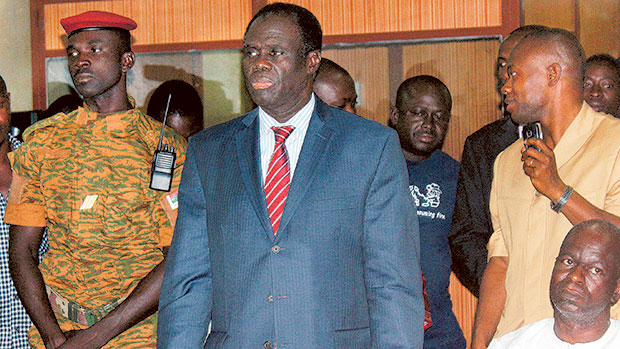
Addis Ababa: The African Union on Monday welcomed the appointment of career diplomat Michel Kafando as Burkina Faso’s interim president following the ousting of its veteran leader.
AU chief Nkosazana Dlamini-Zuma praised the people of the West African state “for their political maturity and sense of responsibility”, and called for “a smooth transition under the direction of civil authorities”.
The appointment of the former foreign minister and UN ambassador is set to end weeks of uncertainty in the impoverished country after mass protests toppled the 27-year regime of president Blaise Compaore and the military seized power.
The naming of the interim leader came ahead of a two-week deadline the AU had given the country’s army to return the state to civilian rule.
Dlamini-Zuma said she “welcomes the restoration of the constitution” and the “significant progress” made towards civilian rule, repeating the AU’s commitment and support to the country.
The 54-member bloc also called on the international community to support efforts to “deepen democracy” in the country.
Kafando, who will have to be confirmed by the Constitutional Council, previously served as the country’s ambassador to the United Nations from 1998 to 2011. He was also Burkina Faso’s foreign affairs minister between 1981 and 1982.
Mass unrest erupted in Burkina Faso in late October over ex-president Blaise Compaore’s bid to change the constitution, which would have allowed him to extend his 27-year rule of the landlocked former French colony.
“It is an awesome responsibility that falls to me, I already foresee the pitfalls and the immensity of the task,” the 72-year-old Kafando told reporters after his appointment that he described as “more than an honour”.
Kafando, who will have to be confirmed by the Constitutional Council, previously served as the country’s ambassador to the United Nations from 1998 to 2011. He was also Burkina Faso’s foreign affairs minister between 1981 and 1982.
After hours of negotiations, a panel of 23 officials, mainly civilians, chose Kafando over other candidates who included journalist Cherif Sy and sociologist and ex-minister Josephine Ouedraogo.
Initially Paul Ouedraogo, the Catholic archbishop of the southern Bobo-Dioulasso diocese, appeared to be a front-runner despite his reluctance, but the Church later announced “categorically” that he was not in the race.
“The consensus candidate is Michel Kafando,” said Ignace Sandwidi, a representative of the Catholic Church, which was involved in the discussions to find a new leader.
Kafando’s appointment came after a weekend of activity that saw the military on Saturday reinstate the constitution that it suspended when it took over following Compaore’s ousting in a popular revolt.
On Sunday the military officially signed a “transition charter” — a sort of interim constitution hammered out between the military and civilian, opposition and religious figures last week.
Applause erupted after Lieutenant-Colonel Isaac Zida, the army-installed leader, initialled the document which marked his acceptance of a return to civilian leadership in the country.
Under the deal, the president will appoint a prime minister, either a civilian or a military figure, who will head a 25-member transitional government.
A civilian will also head a 90-seat parliament, known as the National Transitional Council.
According to a draft of the transition blueprint, no members of the interim regime will be allowed to stand in the November 2015 election.
Zida had given all the various actors involved in the transition until noon on Sunday to submit their candidates for interim leader to the panel.
The African Union had given the country an ultimatum on November 3, saying it would face sanctions unless it established institutions and picked an interim president by Monday.
Mass unrest erupted in Burkina Faso in late October over ex-president Blaise Compaore’s bid to change the constitution, which would have allowed him to extend his 27-year rule of the landlocked former French colony.
Compaore was only 36 when he seized power in a 1987 coup in which his former friend and one of Africa’s most loved leaders, Thomas Sankara, was ousted and assassinated.
He hung to power in the following decades, being re-elected president four times since 1991 and his bid to extend his rule was being closely watched across Africa, where at least four heads of state were considering similar changes to stay in power, from Burundi to Benin and the Democratic Republic of Congo.
Known in colonial times as Upper Volta, the country won independence from France in 1960 and its name was changed to Burkina Faso — “the land of upright men” — in 1984.












